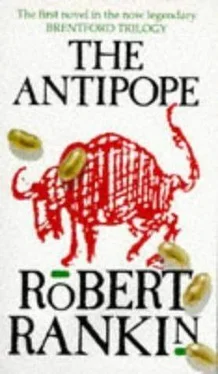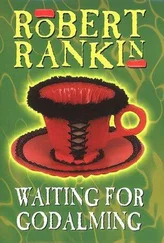Robert Rankin - The Antipope
Здесь есть возможность читать онлайн «Robert Rankin - The Antipope» весь текст электронной книги совершенно бесплатно (целиком полную версию без сокращений). В некоторых случаях можно слушать аудио, скачать через торрент в формате fb2 и присутствует краткое содержание. Жанр: Современная проза, на английском языке. Описание произведения, (предисловие) а так же отзывы посетителей доступны на портале библиотеки ЛибКат.
- Название:The Antipope
- Автор:
- Жанр:
- Год:неизвестен
- ISBN:нет данных
- Рейтинг книги:4 / 5. Голосов: 1
-
Избранное:Добавить в избранное
- Отзывы:
-
Ваша оценка:
- 80
- 1
- 2
- 3
- 4
- 5
The Antipope: краткое содержание, описание и аннотация
Предлагаем к чтению аннотацию, описание, краткое содержание или предисловие (зависит от того, что написал сам автор книги «The Antipope»). Если вы не нашли необходимую информацию о книге — напишите в комментариях, мы постараемся отыскать её.
The Antipope — читать онлайн бесплатно полную книгу (весь текст) целиком
Ниже представлен текст книги, разбитый по страницам. Система сохранения места последней прочитанной страницы, позволяет с удобством читать онлайн бесплатно книгу «The Antipope», без необходимости каждый раз заново искать на чём Вы остановились. Поставьте закладку, и сможете в любой момент перейти на страницу, на которой закончили чтение.
Интервал:
Закладка:
Togging up at a theatrical outfitter’s with his last few pennies Horatio B. Carson applied for the post. His characterization must have been as convincing as that of Charles Laughton in Mutiny on the Bounty , because “Captain” Carson was immediately accepted for the job.
His duties were not arduous. Few if any sailors had ever honoured the Mission with their visits. However, a proliferation of down and outs, ne’er-do-wells, roguish knights of the road, shoelace pedlars and grimy individuals smelling strongly of meths and cheap sherry had soon appeared upon the doorstep. The Captain welcomed each in turn, extending to them the utmost courtesy, carrying their sorry bundles and opening doors before them.
“Here is your room, sir,” he would say, drawing their attention to the luxuriance of the pillows and the fine quality of the bedcoverings. “Our last lodger had to leave in something of a hurry,” he would explain. “He, like your good self, was a seafaring man and the doctors at the isolation hospital said that there would have been some hope of saving his life had they been able to identify the crippling and particularly virulent form of disease to which he so sadly succumbed. I haven’t had a chance to fumigate the room yet, but I am sure that your travels must by now have made you immune to most sicknesses, even of the horrendously disfiguring and painful variety which so sorrowfully took him from us.”
At this point the Captain would remove his hat, place it over his heart and look skyward. The tramp to which he was addressing this tragic monologue would follow the direction of his eyes then make his exit, often at astonishing speed, with talk of “pressing engagements” and “business elsewhere”.
In the thirty long years of the Captain’s residence, no visitor, no matter how apparent his need or dire his circumstance, be his tale one to raise a tear in a glass eyeball, no visitor had ever spent a single night within the Seamen’s Mission.
On this particular morning as the Captain stood upon the porch his thoughts dwelt mainly upon money, the strange ways of fate and the scourge of homosexuality. He knew that he could not expect many more years within the Mission and that his days were most definitely numbered. The job supplied no pension, and with the swelling list of forged signatures speaking of the enormous physical effort required of one man to maintain the Mission there had been talk of employing a younger person. The yearly meeting between himself and the Foundation’s trustees had been but a week before and he, the Captain, had handed over his tailored accounts and spoken modestly of his good works. But a new face had appeared upon the Committee this year, a young and eager face. During the previous twelve months one of the Trustees had died and the lot had fallen to his nephew to succeed him.
Young Brian Crowley had no love for elderly sea captains. His distaste for such patriarchs was only exceeded by his out-and-out hatred for tramps, loafers, down-and-outs, gypsies, foreigners and women. The limp-wristed Brian cared little for anybody other than an Italian waiter who worked at the Adelaide Tea Rooms. He had promised to set Mario up in his own restaurant, the dago waiter being a veritable “wizard-de-cuisine” and exceptionally well hung into the bargain.
The fates, which had conspired to arrange the sad demise of his dear uncle and Brian’s succession to the Foundation committee, had also decreed that this year the Council would raise their annual offer for the purchase of the Mission to a more than adequate sum.
The Captain sucked again upon his pipe. He could read faces well enough, and young Brian’s had been an open book. It might well be the time to shape up and ship out. His nest-egg was by now pretty substantial, enough for a small cottage somewhere, possibly by the sea. It might be nice to actually see the waves breaking on a beach. “I wonder if they make a lot of noise?” he said to himself.
Suddenly far up the road a flicker of movement caught his eye. He watched with passing interest as a ragged figure turned the corner beside the Memorial Library and shambled towards him with an odd yet purposeful gait.
It was the figure of a tramp. The Captain raised his nautical glass to view the apparition. A swift glance was enough. “Ugh!” said the Captain.
The tramp plodded nearer and nearer, and the Captain rummaged about in his vast mental storehouse for a tale of woe suitable to the occasion. Strangely none seemed readily available. The tramp trod closer, his big floppy boots stomping down into the ground. The Captain began to whistle an uneasy version of the famous shanty “Orange Claw Hammer”.
The tramp was crossing the road towards the Mission. He stopped. The Captain ceased his whistling. The birds were silent and the Captain could no longer smell the fragrant scent of honeysuckle. He felt cold, and even though the early summer sun breathed down upon him a shiver arose at the base of his spine. The Captain held his breath. Of a sudden the wretch turned upon his heel and stalked away down a side turning. As if at a signal the birds burst forth again into a cascade of song and the Captain regained the use of his nostrils. He let free a sigh of utmost relief and reached into his sleeve for his matches.
“Could I trouble you for a glass of water, please?” said a voice at his elbow.
The Captain turned in horror, spilling his matches to the ground. Beside him stood a tramp of hideous aspect. “Sorry, did I startle you?” said the creature with what seemed to be a voice of genuine concern. “It is a bad habit of mine, I really most control it.”
“Damn you, sir,” swore the Captain, “creepin’ up on a fella.”
“My apologies,” said the tramp, removing the battered relic which served him as hat, and bowing to the ground. “But if you would be so kind, a glass of water would serve well at this time.”
The Captain muttered a terse “Come in then” and led his unspeakable visitor into the Mission. “You caught me at a bad moment,” he said.
The tramp found no cause to reply.
“I was just having a moment or two’s fresh air before I continue my search.” The Captain drew the tramp a glass of water. The tramp received it with a great show of gratitude. “My thanks,” said he.
“Yes,” the Captain continued, “my search.”
The tramp seemed uninterested in the Captain’s search but he nodded politely.
“Yes, carelessly I have upset my case of deadly scorpions; I fear that they have gone to earth in the sleeping quarters.”
“Scorpions indeed?” said the tramp. “I have some experience in such matters, I will help you search.”
The Captain eyed his visitor with suspicion. “That will not be necessary, I should not like there to be an unfortunate accident, these fellows are wantonly vicious in their attitude towards any but myself.”
“If you are on such good terms, possibly you should just put out some milk and give them a call,” said the tramp helpfully.
The Captain sucked strongly upon his pipe. “I fear that that would prove futile,” he said. “Devious fellows scorpions, and mine I believe to be deaf.”
“Devious indeed,” said the tramp. “Have you seen this trick?” He held the glass of water out at arm’s length and stared into it with a fixed and steady gaze. The Captain watched in puzzlement, his eyes flickering between the glass and the tramp’s glaring red pupils, which now began to glitter with a strange and sinister light.
Bubbles began to appear in the glass; one by one they popped to the surface, growing in force one upon another they burst upwards; steam began to rise.
The Captain said, “It’s boiling, be damned!”
The tramp handed the churning glass to the Captain, who gingerly received it. “I should like a room for the night,” said the tramp.
Читать дальшеИнтервал:
Закладка:
Похожие книги на «The Antipope»
Представляем Вашему вниманию похожие книги на «The Antipope» списком для выбора. Мы отобрали схожую по названию и смыслу литературу в надежде предоставить читателям больше вариантов отыскать новые, интересные, ещё непрочитанные произведения.
Обсуждение, отзывы о книге «The Antipope» и просто собственные мнения читателей. Оставьте ваши комментарии, напишите, что Вы думаете о произведении, его смысле или главных героях. Укажите что конкретно понравилось, а что нет, и почему Вы так считаете.











